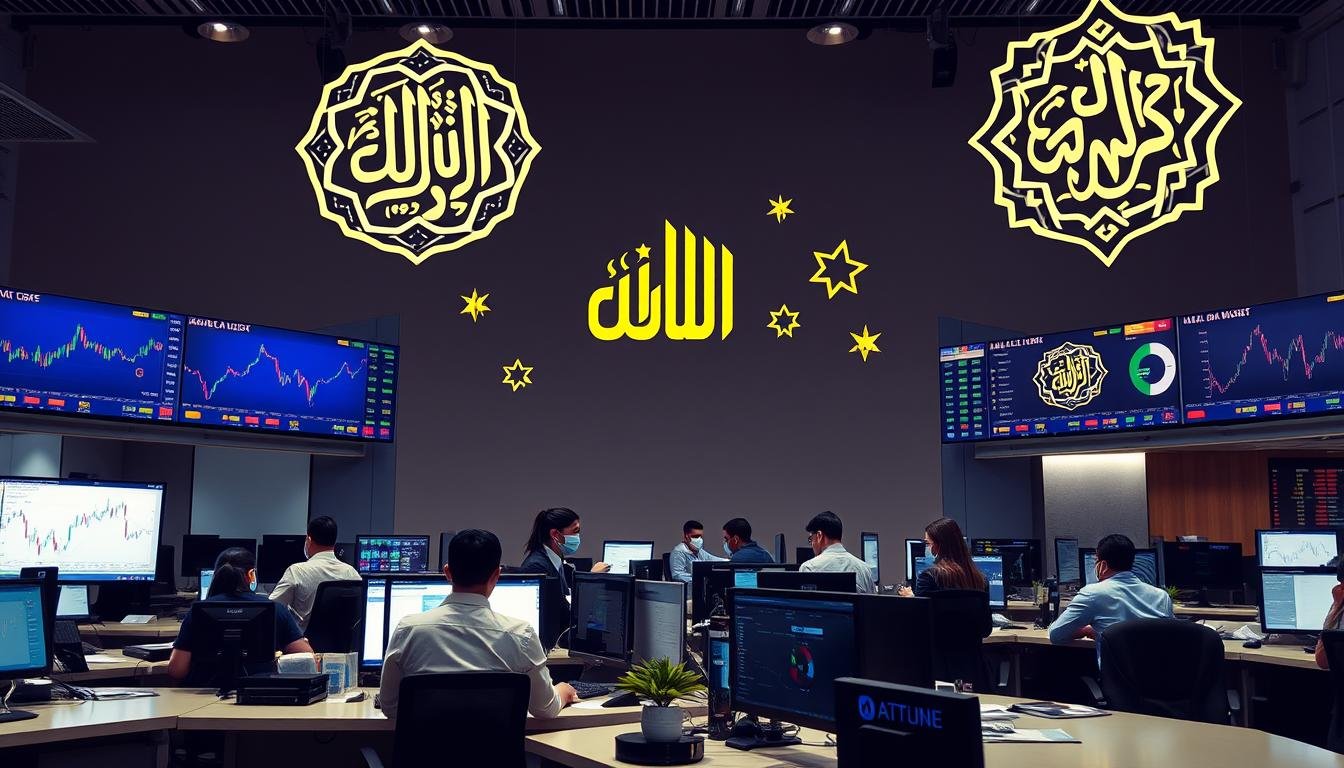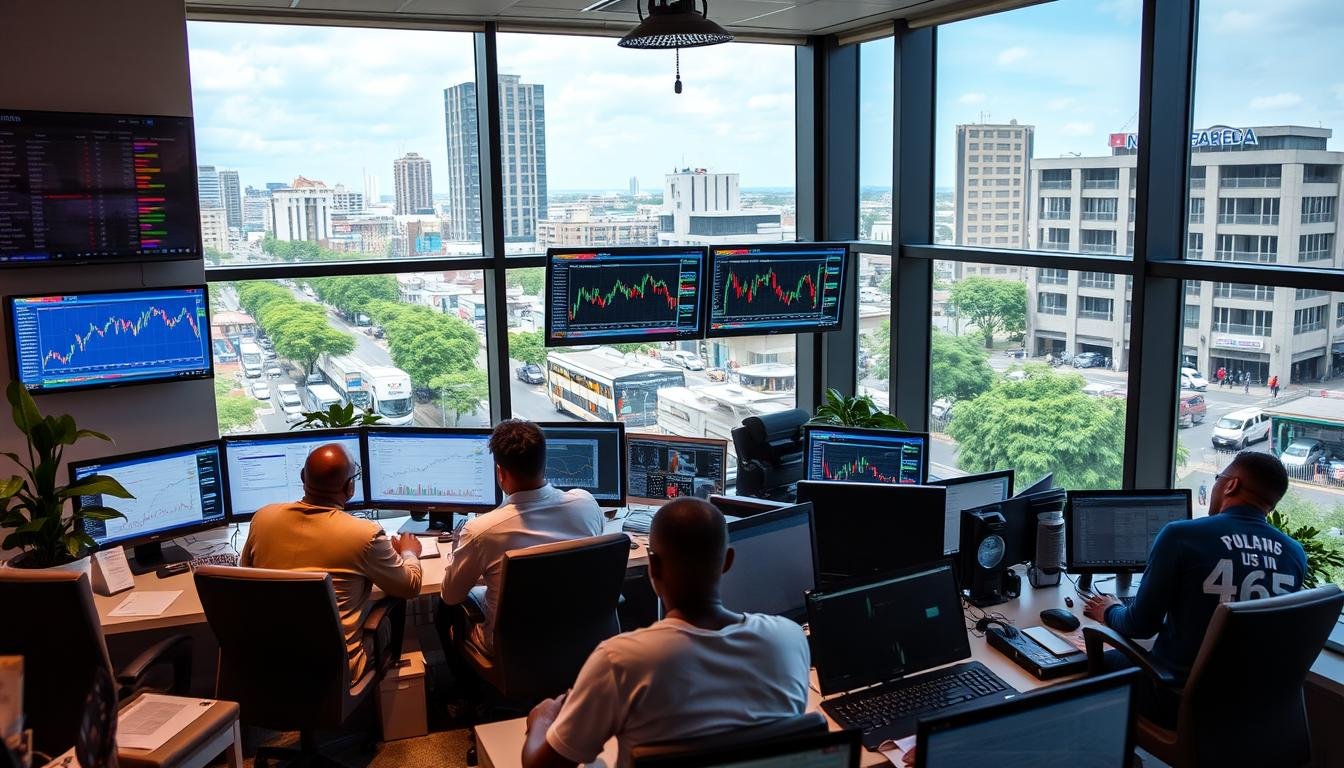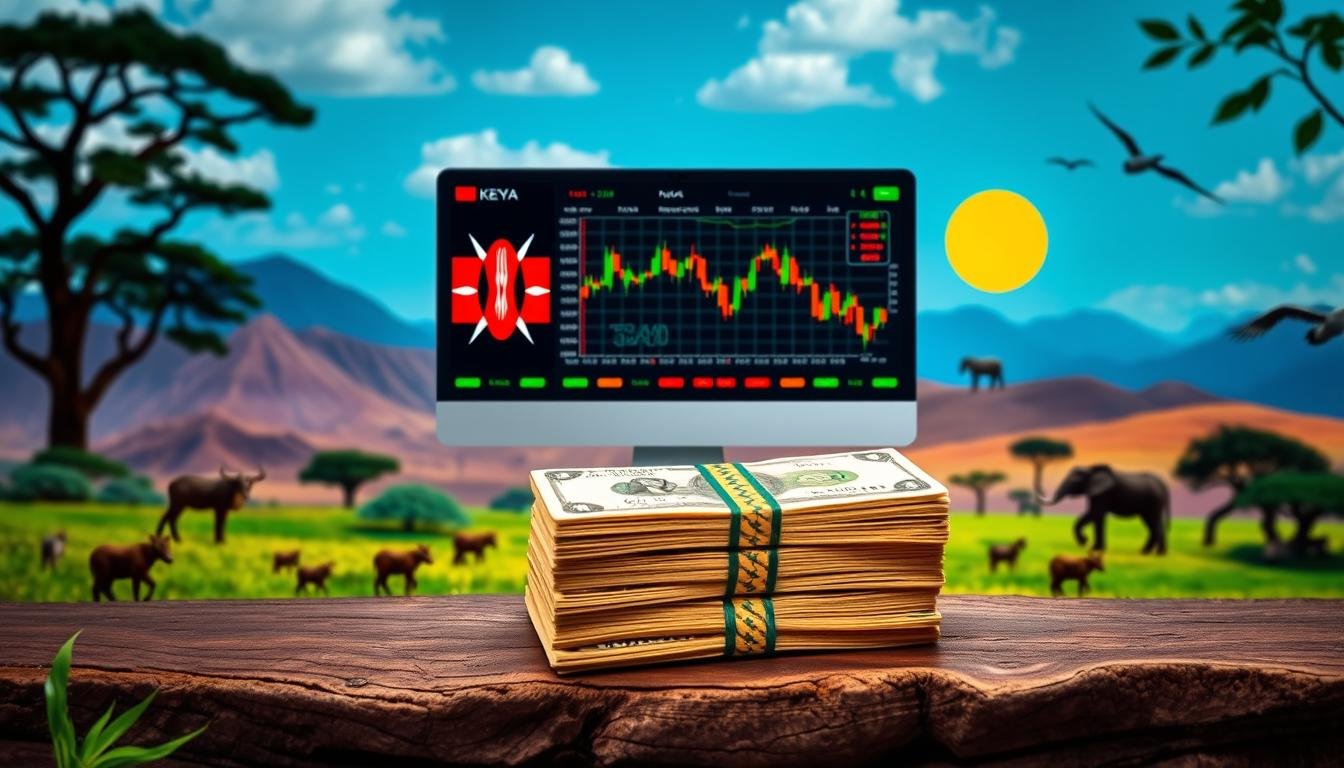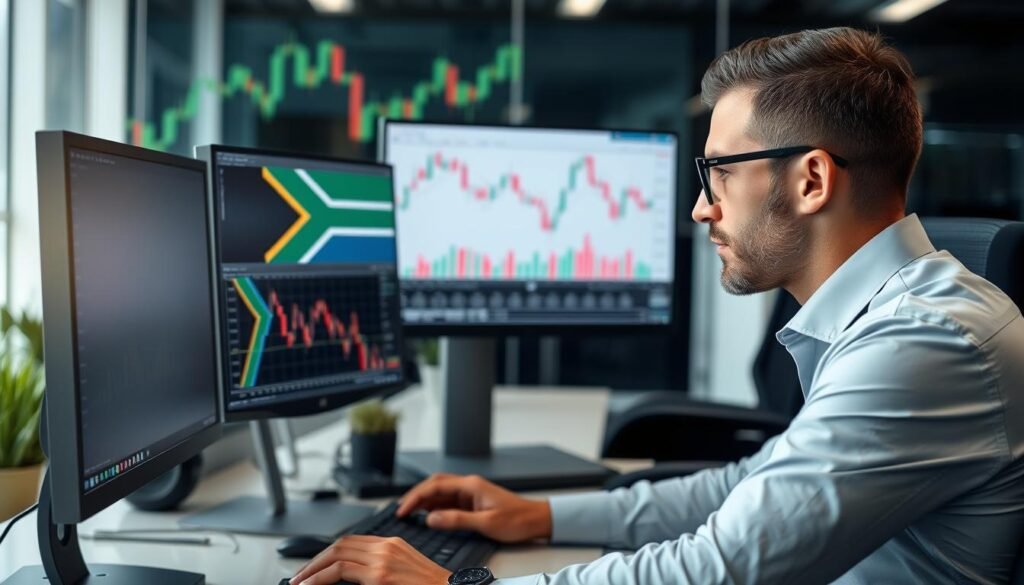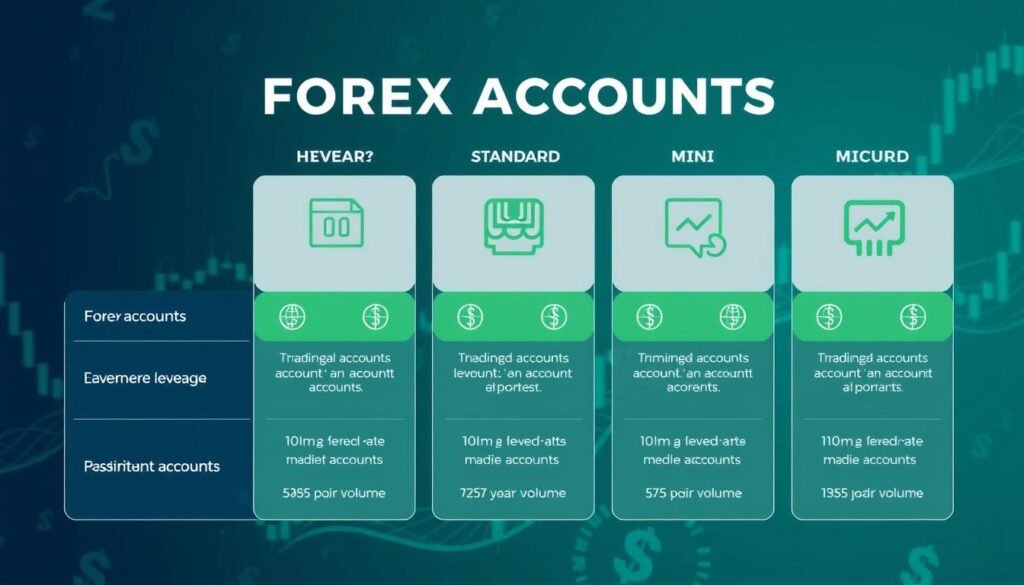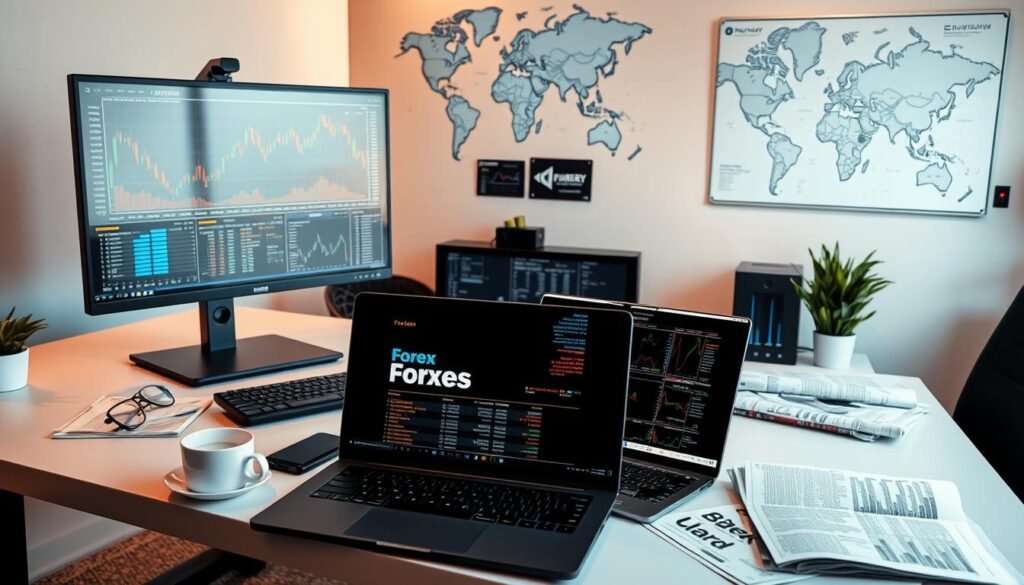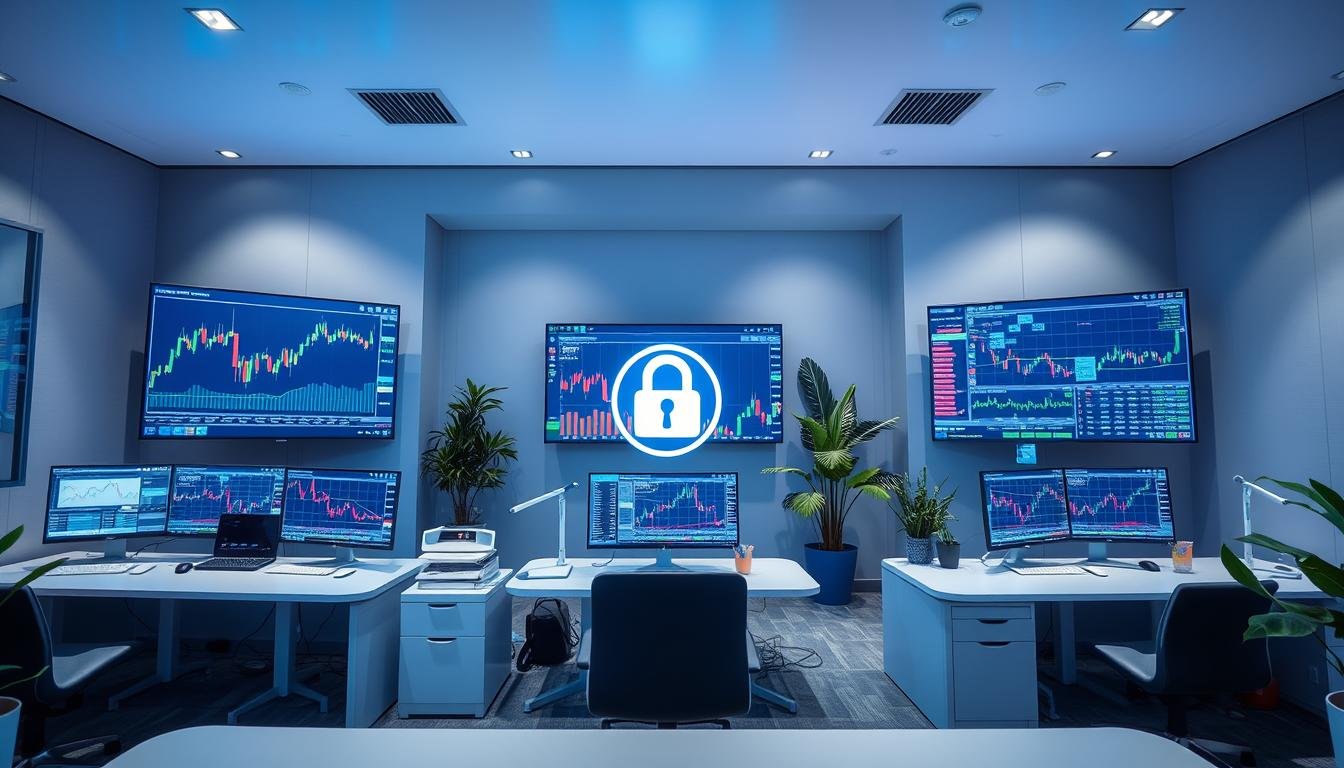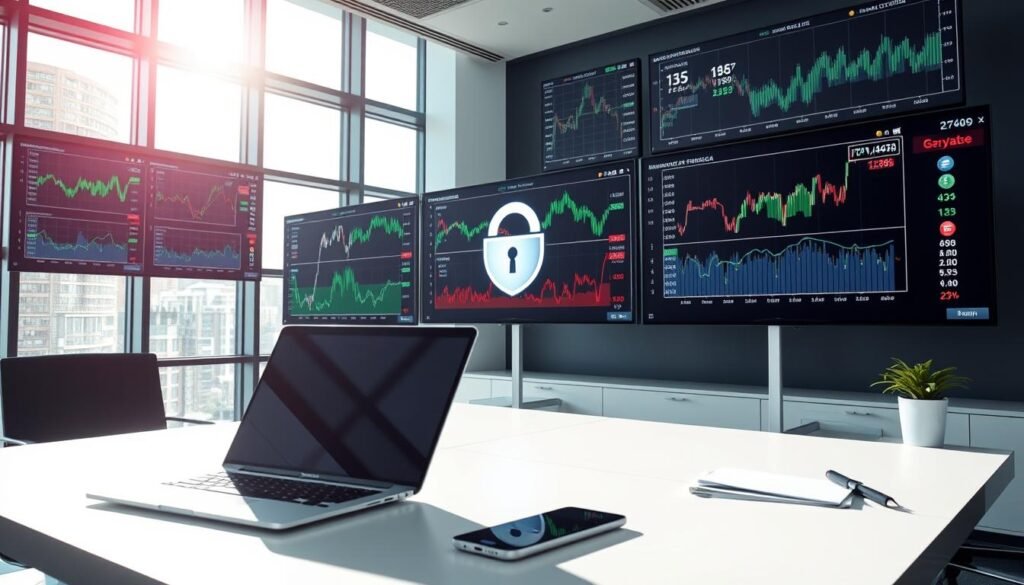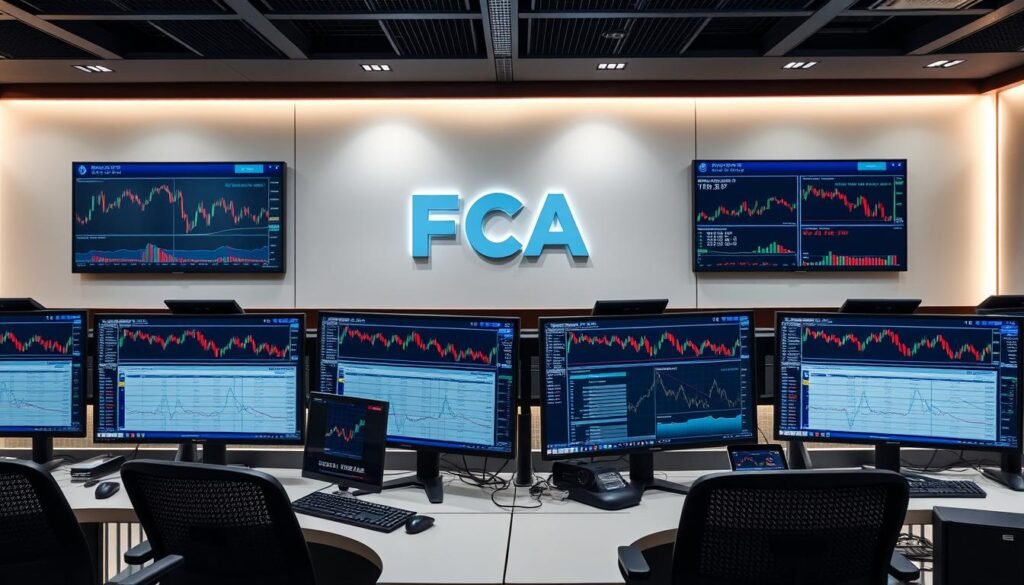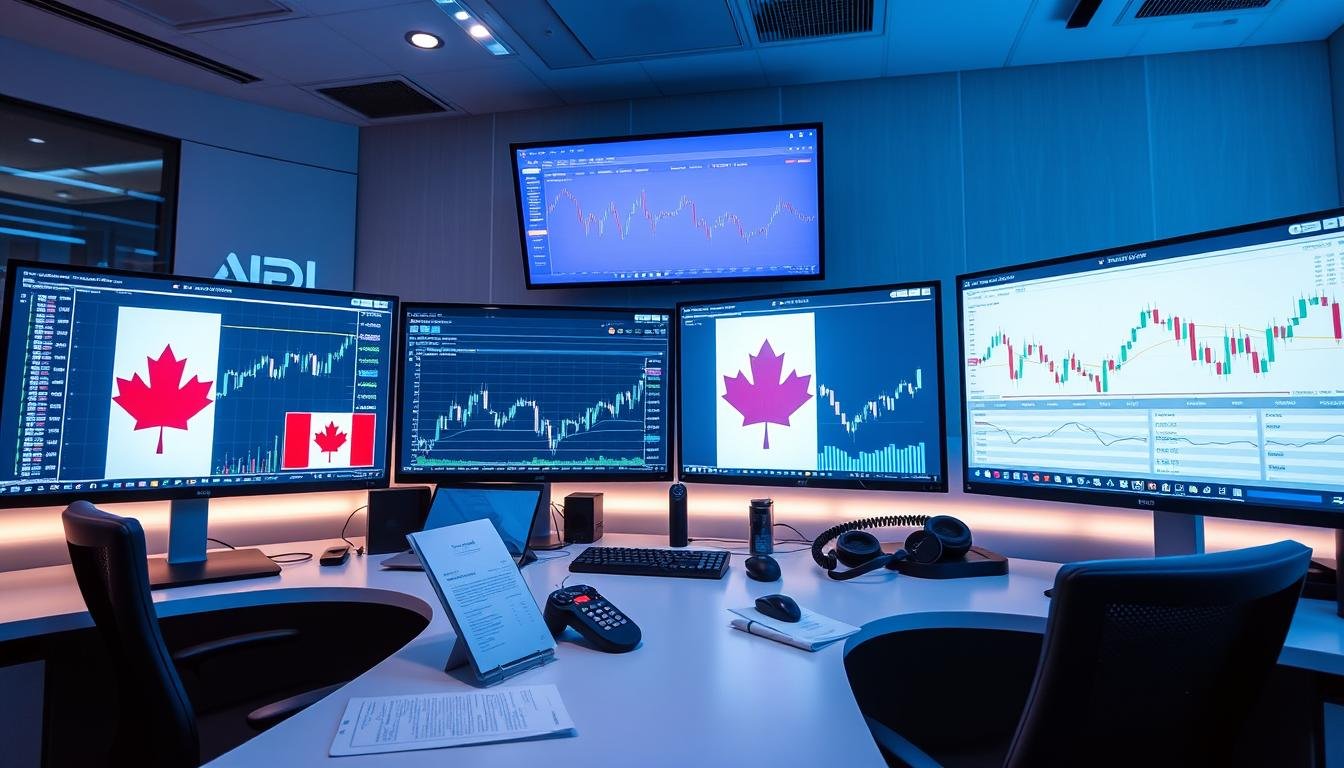FXCM Islamic Account: Sharia-Compliant Forex Trading
In Kenya’s lively financial scene, Muslim traders look for ways to invest that fit their faith. FXCM, a top forex broker worldwide, has created the FXCM Islamic Account. It lets Kenyan traders trade in a way that follows Islamic finance rules.
The FXCM Islamic Account meets the needs of Muslim investors. They can join the fast-paced currency markets without breaking Islamic finance rules. This account has no interest charges, perfect for those wanting to trade fxcm islamic account, forex islamic trading, swap-free forex account, sharia-compliant forex trading, halal forex investing, islamic fx trading platform, no-interest forex account, islamic capital markets, fxcm shariah-compliant account, muslim forex traders.
Key Takeaways
- FXCM Islamic Account offers Sharia-compliant forex trading for Kenyan Muslim traders
- Eliminates interest charges, aligning with Islamic finance principles
- Provides a swap-free trading environment for halal forex investing
- Offers an Islamic fx trading platform for Muslim traders in Kenya
- Enables participation in the currency markets while adhering to Islamic capital markets
Understanding Islamic Finance Principles
Islamic finance has key principles for sharia-compliant investing. Two main ideas are the ban on riba (interest) and avoiding gharar (too much uncertainty). FXCM’s Islamic account follows these rules, offering a swap-free trading space that meets Sharia law.
Riba: The Prohibition of Interest
The Islamic finance world bans interest, called riba. It believes money shouldn’t make more money without risk or work. FXCM’s Islamic account removes interest from traditional forex trading, making it sharia-compliant.
Gharar: Avoiding Excessive Uncertainty
Islamic finance also focuses on avoiding gharar, or too much uncertainty. It tries to reduce speculation in financial deals, making sure everyone knows the terms. FXCM’s Islamic account is clear and defined, offering a reliable space for Muslim traders.
“The ban on riba and avoiding gharar are key to sharia-compliant investing. FXCM’s Islamic account supports these rules, letting Muslim traders trade in the forex market while following their faith.”
Knowing these Islamic finance basics helps Muslim traders make smart choices. They can trade forex in a way that respects their faith and values.
Introducing FXCM Islamic Account
At FXCM, we know Muslim traders in Kenya have special needs. That’s why we created the FXCM Islamic account. It’s a trading solution that follows Sharia law. This swap-free forex account removes any interest charges, making it a sharia-compliant trading platform for halal forex investing.
Our Islamic fx broker gives you a smooth trading experience. You can trade with confidence and peace of mind. We follow Islamic finance principles, making our platform fit your values and help you achieve your financial goals.
“FXCM’s Islamic account has been a game-changer for me. It allows me to participate in the forex market without compromising my religious principles.”
Whether you’re experienced or new to halal forex investing, the FXCM Islamic account is here for you. It’s a secure and reliable way to reach your financial dreams. See the benefits of trading with a sharia-compliant trading platform and explore the global markets’ opportunities.
Benefits of FXCM Islamic Account
The FXCM Islamic account is great for Muslim traders in Kenya. It has benefits that match Islamic finance rules. It removes interest charges and offers Shariah-compliant leverage. This lets traders invest in forex in a way that’s okay with their faith.
Swap-Free Trading Environment
The FXCM Islamic account has a big plus: no overnight interest. This means traders don’t face the riba (interest) that’s not allowed in Islamic finance. It makes trading without interest possible, keeping the account in line with Shariah law.
Shariah-Compliant Leverage
This account also has Sharia-compliant leverage. It helps traders manage risks while sticking to Islamic finance rules. The leverage is made to fit Shariah law, so traders can use it without breaking their religious rules.
With these features, the FXCM Islamic account helps Muslim traders in Kenya. It lets them trade without swaps and use leverage. This is key for getting the most out of their trading and investing in a way that’s halal.
How FXCM Islamic Account Works
The FXCM Islamic account is made for Muslim traders in Kenya. It offers a trading space without swaps, fitting Islamic finance rules. This setup makes sharia-compliant forex trading and halal investing possible.
The heart of the FXCM Islamic account is its swap-free trading mechanics. Unlike regular forex accounts, it doesn’t charge or earn interest on open positions. This way, traders can trade without breaking Sharia law’s rule against Riba (interest).
The fxcm islamic account structure meets Muslim investors’ needs. It removes swap fees for overnight positions, making it a Shariah-compliant choice for halal investing process. This lets Muslim traders in Kenya trade in the forex market while staying true to their faith.
| Key Features | Benefits |
|---|---|
| Swap-Free Trading | No interest charged or earned on open positions |
| Sharia-Compliant Leverage | Access to leverage while maintaining Shariah compliance |
| Halal Investing Process | Participate in the forex market without violating Islamic principles |
FXCM’s fxcm islamic account structure meets the special needs of Muslim traders. It lets Kenyan investors join the global financial markets while keeping their religious beliefs and values.
Account Opening Process
Opening an FXCM Islamic account in Kenya is easy and follows Sharia-compliant rules. Muslim traders need to provide documents to prove their identity and meet the fxcm islamic account opening criteria.
Documentation Requirements
The documentation for sharia-compliant forex includes several items:
- Valid government-issued ID (e.g., national ID, passport)
- Proof of residential address (e.g., utility bill, bank statement)
- Completed FXCM account application form
- Signed declaration confirming adherence to Islamic finance principles
These requirements for halal investing help make the muslim trader onboarding process smooth. They also help open a Sharia-compliant trading account with FXCM.
“The documentation requirements are designed to uphold the principles of Islamic finance and provide a transparent process for our Muslim traders.”
By following these steps, fxcm islamic account opening in Kenya is simple. It lets traders use a swap-free trading environment and Shariah-compliant leverage options.
Trading Platforms for Islamic Traders
In Kenya, Islamic traders can use Sharia-compliant trading platforms from FXCM. These platforms meet the needs of Muslim investors. They offer features that follow the rules of halal investing.
The FXCM Islamic Account is a top choice. It lets you trade Forex without any interest charges. This is important because interest, or riba, is not allowed in Islamic finance.
| Platform | Key Features |
|---|---|
| FXCM MT4 Islamic |
|
| FXCM Trading Station Islamic |
|
| FXCM WebTrader Islamic |
|
These fxcm islamic trading platforms provide sharia-compliant forex trading tools and halal investing technology. They are designed for muslim trader platform options in Kenya. These platforms make it easy for Islamic traders to trade Forex while following their faith.
“The availability of Sharia-compliant trading platforms has been a game-changer for Muslim investors in Kenya. It allows us to participate in the financial markets while staying true to our faith.”
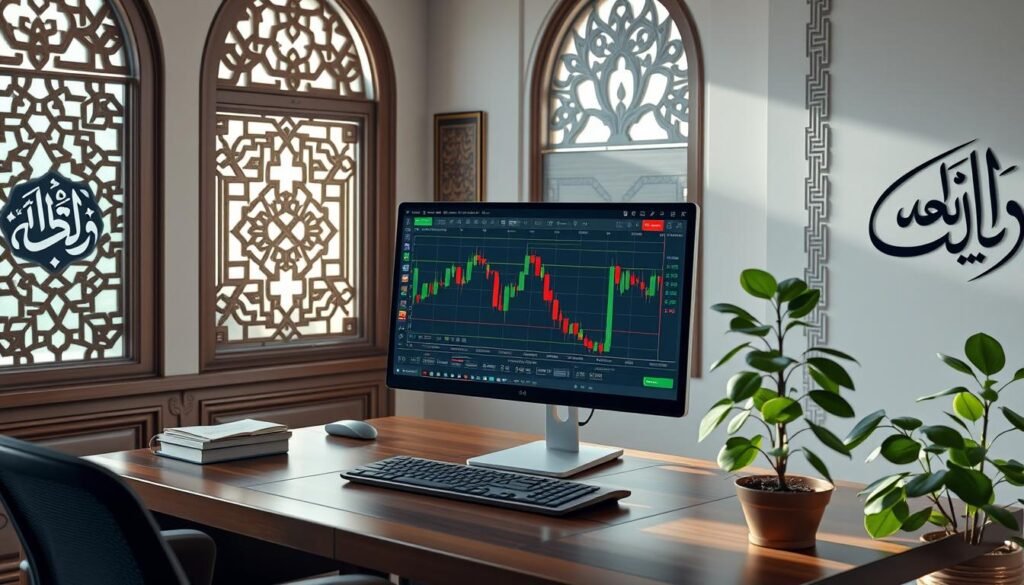
Islamic Account Funding Options
Muslim investors in forex trading need financial options that fit their beliefs. FXCM in Kenya offers sharia-compliant deposit methods for Muslim traders. This makes it simpler for Muslim trader banking options to join the forex market while following their faith.
Traders can put money into their FXCM Islamic account through fxcm islamic account funding choices like bank transfers and e-wallets. These sharia-compliant deposit methods help keep their halal investing in line with Islamic finance rules.
| Funding Method | Sharia Compliance | Processing Time | Minimum Deposit |
|---|---|---|---|
| Bank Transfer | Compliant | 1-3 Business Days | $100 |
| e-Wallet (Skrill, Neteller) | Compliant | Instant | $10 |
| Debit/Credit Card | Non-Compliant | Instant | $10 |
FXCM’s sharia-compliant deposit methods let Muslim trader banking options easily fund their fxcm islamic account. This way, they can take part in halal investing in the forex market.
“FXCM’s flexible funding options have made it easier for me to manage my capital in a way that aligns with my Islamic beliefs. The ability to deposit funds through sharia-compliant methods has been a game-changer for my forex trading journey.”
– Fatima Ahmed, FXCM Islamic Account Holder
Risk Management Strategies
Effective risk management is key for successful forex trading, especially in Sharia-compliant accounts. FXCM’s Islamic account offers Muslim traders in Kenya important tools. These tools help them use sharia-compliant trading strategies and halal investing risk mitigation measures.
Stop Loss and Take Profit Orders
One important risk control tool for muslim traders with an FXCM Islamic account is stop-loss and take-profit orders. These orders help manage risk by automatically closing positions at set price levels. This minimizes losses and secures profits.
- Stop-loss orders set a price at which a position will close, limiting risk.
- Take-profit orders set a target price for closing a position, securing gains and following halal investing principles.
Using these risk management features, FXCM Islamic account holders can control their exposure. They can trade in a way that follows Sharia-compliant finance guidelines.
“Proper risk management is the cornerstone of successful Sharia-compliant trading. FXCM’s Islamic account provides the tools and features Muslim traders in Kenya need to trade safely and ethically.”
Shariah Advisory Board Oversight
FXCM’s Islamic account is watched closely by a Shariah Advisory Board. This group includes respected Islamic finance experts. They make sure the account follows Sharia law.
This careful check gives our Muslim traders in Kenya peace of mind. They know their investments are in line with their faith.
The Shariah Advisory Board is key in keeping FXCM’s Islamic accounts right. They check everything to make sure it fits Islamic rules. This halal investing certification means our Muslim trader clients can trust their investments.
“The Shariah Advisory Board’s oversight ensures that our Islamic account provides a truly Sharia-compliant environment for our Muslim clients, giving them the peace of mind they deserve in their financial endeavors.”
FXCM is dedicated to meeting the Islamic finance community’s needs in Kenya. Our clients know their accounts are always checked by top Shariah experts.

Educational Resources for Islamic Traders
At FXCM, we know how vital educational resources are for Islamic traders in Kenya. As a top Sharia-compliant forex broker, we aim to give our Muslim clients the tools they need to succeed in halal investing.
Webinars and Seminars
FXCM offers educational webinars and seminars on various topics in Islamic finance principles and Sharia-compliant forex trading. These sessions are interactive, helping you grasp the details of fxcm islamic account education. They also give you practical tips for your sharia-compliant forex training.
Our webinars cover key Islamic finance concepts like the ban on riba (interest) and avoiding gharar (excessive uncertainty). This knowledge helps you understand halal investing knowledge resources better. It also prepares you to make smart trading choices within a muslim trader learning opportunities framework.
We also host seminars with industry experts and seasoned Islamic traders. These gatherings offer a chance to discuss important topics, ask questions, and learn from others in the Sharia-compliant forex trading field.
“The educational resources provided by FXCM have been invaluable in my journey as an Islamic trader. The webinars and seminars have not only deepened my understanding of Sharia-compliant finance but have also equipped me with practical strategies to navigate the complexities of halal investing.”
– Ahmed, an FXCM Islamic account holder in Kenya
Customer Support for Islamic Accounts
At FXCM, we know our Muslim traders in Kenya have special needs. That’s why we have a team ready to help with fxcm islamic account customer service and sharia-compliant trading support. Our Islamic account holders can count on us for any halal investing assistance and muslim trader dedicated support.
Our customer service team works hard to make sure you have a great experience. Need help with our trading platforms, funding your account, or our Shariah-compliant policies? We’re here to assist you.
“FXCM’s Islamic account customer service has been invaluable in helping me navigate the world of Sharia-compliant trading. They’ve provided me with the support and resources I need to feel confident in my halal investing activities.”
FXCM aims to create a welcoming space for all Muslim traders. Our dedicated team is part of how we support our fxcm islamic account customer service. We work hard to ensure a sharia-compliant trading support experience that meets your needs.
Comparison with Other Islamic Forex Brokers
When looking at sharia-compliant forex trading options in Kenya, Muslim traders need to compare FXCM’s Islamic account with other halal investing platforms. They should look at trading conditions, account features, and how well the broker follows Islamic finance. It’s also important to check the regulatory oversight and if the broker aligns with Islamic finance principles.
One key thing to check is the swap-free trading environment offered by brokers catering to Muslim traders. FXCM’s Islamic account doesn’t charge swaps, which is okay under Shariah law. But, other brokers might have different rules and conditions.
Another important factor is the Shariah-compliant leverage offered. FXCM’s Islamic account lets Muslim traders use leverage in a way that follows Shariah. It’s good for managing risk while sticking to Islamic finance rules. Looking at the leverage options of different Islamic forex brokers helps Kenyan traders make a smart choice.
It’s also key to check the regulatory oversight and if the broker has a Shariah advisory board. FXCM’s Islamic account is watched by a Shariah board to make sure it follows Islamic finance. Looking into the rules and Shariah compliance of other brokers is also helpful.
By comparing FXCM’s Islamic account with other sharia-compliant forex trading options, Muslim traders in Kenya can pick the best halal investing platform. This choice should fit their trading needs and follow their religious and ethical beliefs.
“Selecting the right Islamic forex broker is crucial for Kenyan Muslim traders to ensure their investments are in line with Shariah law.”
Conclusion
FXCM’s Islamic account is a great choice for Muslim traders in Kenya. It lets them trade in the forex market without breaking Sharia law. This account has no interest charges and is swap-free, making it a good option for halal investing opportunities.
FXCM offers lots of educational resources and customer support. They also have a Shariah Advisory Board to make sure everything is right. This makes FXCM’s Islamic account a strong choice for those wanting to trade in a way that follows their faith.
For Muslim traders in Kenya, FXCM’s Islamic account is a solid choice. It’s a Sharia-compliant way to get into the exciting world of Sharia-compliant forex trading. With FXCM, you can explore currency trading and stay true to your faith.
FAQ
What is an FXCM Islamic account?
An FXCM Islamic account is for Muslim traders in Kenya. It lets them trade forex without breaking Islamic rules. This account doesn’t charge interest, making it perfect for those who want to trade while following Islamic principles.
How does the FXCM Islamic account comply with Islamic finance principles?
The FXCM Islamic account doesn’t charge interest on open positions. This follows Islamic finance rules. It avoids interest (riba) and excessive risk (gharar).
What are the key benefits of the FXCM Islamic account?
The FXCM Islamic account has many benefits. It offers a swap-free trading environment and Shariah-compliant leverage. These features help Muslim traders in Kenya trade in the currency markets while following their beliefs.
How do I open an FXCM Islamic account?
To open an FXCM Islamic account in Kenya, you need to provide some documents. You’ll need a valid ID and proof of address. These documents help verify your identity and make sure you can open a Sharia-compliant account.
What trading platforms are available for FXCM Islamic account holders?
FXCM has many trading platforms for Islamic traders in Kenya. These platforms are designed to make trading easy and Sharia-compliant. They have features that follow the rules of halal investing.
How can I fund my FXCM Islamic account?
FXCM’s Islamic account in Kenya has many funding options. You can deposit funds using Sharia-compliant methods. This includes bank transfers or e-wallets, ensuring your capital sources match your religious beliefs.
How does FXCM ensure the Sharia compliance of its Islamic account?
FXCM’s Islamic account is overseen by a Shariah Advisory Board. This board of Islamic finance experts checks if the account follows Sharia law. This gives Muslim traders in Kenya the assurance they need.
What educational resources does FXCM offer for Islamic traders?
FXCM knows how important education is for Islamic traders in Kenya. They offer webinars and seminars on Sharia-compliant forex trading and halal investing. This helps traders learn and grow.
How does FXCM’s Islamic account compare to other Sharia-compliant forex brokers?
When choosing an Islamic forex account, it’s key to compare FXCM with other Sharia-compliant brokers. Look at trading conditions, account features, and regulatory oversight. This helps you find the best halal investing platform for your needs.

